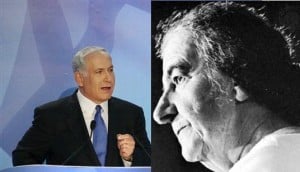This week I met with an Israeli military official, who spoke on the condition of anonymity, about Israeli Prime Minister Bibi Netanyahu’s leadership. While he lauded his economic acumen and abilities as a politician, the official continually said that Bibi is insincere about peace with the Palestinians and unable to make the tough and unpopular decisions. “He says he wants peace and is willing to do what is necessary, but he doesn’t follow up. His father believed in greater Israel and so does he. Regardless of whether they are ready for a state, the Palestinians can’t be occupied forever. Look at the Arab Spring.” The official also commented that Bibi deflects the issue by hiding behind rhetoric of Israel’s strength, security dilemma with Iran, and his ability to standup to the Obama administration.
By comparison, this sounds very similar to what was transpiring with Golda Meir and her policy towards the Arab states in the lead up to the 1973 Yom Kippur War. Golda felt very empowered and believed that her Arab counterparts wouldn’t dare strike against Israel given the outcome of the 1967 War. She made comments about wanting to make peace but found reasons to evade it. Like Bibi, she used Israeli security and strength as an excuse to not engage her enemies. Like Bibi, she downplayed American pressures to make peace. So what happened in the end? She ignored the signs of an impending war and over 2,000 Israeli’s lost their lives.

For the sake of Israel, Bibi (left) needs to have more foresight than the late Golda Meir (right). If not, than Israeli society should vote him out of office in the next election.
It is also worth noting that like Bibi, Meir continually turned a blind eye and found meandering excuses for settlement construction, legal and illegal.
To return to the topic at hand, some believe peace with Egypt would not have been possible without the Yom Kippur War. However, that suggests that it took a war to get Israeli leadership out of the clouds. Had Golda and her advisors been more balanced and flexible, they may have accomplished the peace accord without the bloodshed.
There is of course no one definitive answer on how to make peace with the Palestinians; and not everything is within Israel’s, or Bibi’s, control (Hamas). That does not change the fact, though, that he has proven unwilling to make the tough decisions needed to make progress with the Palestinians. Bibi, and Israeli society, should reflect on the 1973 Yom Kippur War and take heed in the words of Spanish born poet and philosopher George Santayana, “those who do not learn from history are doomed to repeat it.”